'Round the Table' Family Catechesis
Sin, Parable of the Lost Son, and Sacrament of Reconciliation (13)
SUBJECT: Sin, Parable of the Lost Son, and Sacrament of Reconciliation
AIMS:
- To understand that the relationship of Communion, God’s with us and ours with God, is realized during Eucharist, but also in every Sacrament
- To understand that in every Sacrament God is self-giving to us and we respond by our self-giving to God.
- To recall that flowing gifts and fruits of the Holy Spirit unite us in Jesus with each other
- To recall the concept of COMMUNION, COMMUNITY, CHURCH and BODY OF CHRIST expressed visible way through the parable of the True Vine and to understand that SIN is an opposite of COMMUNION
- To recall what means to REMAIN in the True Vine to understand the opposite – SIN
- To understand that the key to Communion is to listen and follow the Good Shepherd’s voice
- To understand the 4 stages of the Sacrament of Reconciliation and the 4 stages of the prodigal son’s return to the family, Luke 15: 11-31
- During the last session each one of us coloured a branch in a True Vine. What was spread on a table was a visual representation of Communion – being ONE with God and with each other.
- The vine you have in front of you is not as perfect as the one we coloured during the last session. What is the difference between this vine and the one from the last session?

This vine has branches that do not remain in the True Vine, they are not in communion, and soon they will not be a part of the True Vine…
- Today we are going to learn about SIN. What is SIN?
SIN is an opposite of COMMUNION. When we are in Communion we are ONE with God and with each other. SIN separates us…
- Let’s remind ourselves what is COMMUNION and what should we do to remain in COMMUNION in order to understand what SIN is.
Jesus told us that he is the vine and we are the branches. We are all part of the True Vine, part of Jesus’ Body. Vine has a sap with lots of nutrients flowing inside. What flows in the True Vine – Jesus’ Body?
Gifts of the Holy Spirit unite us together.
- When did you become the part of the True Vine?
When you were BAPTISED, your parents made a choice for you to receive the gifts of the Holy Spirit.
- Jesus asked us in the parable of the True Vine to REMAIN in him. What happens to the branch that does not REMAIN?
It separates, and dies.
- How do we REMAIN in Jesus?



- Do we keep these gifts to ourselves?
No! They flow! We share them! We go to doctor when we are sick; he/she shares with us his gifts and help us to be well. We go to the bus stop and the bus comes on schedule driven by a driver who shares his gift. We go to school… teachers, their assistants, cooks, cleaner share their gifts. We too recognise our gifts, thank God for them and develop them so we can share them with others and become a part of the True Vine.
- When do we become one?
We become ONE in the Holy Spirit during the Mass. There is a second Epiclesis – calling down the Holy Spirit - so we can become ONE. The priest says: “Humbly we pray that, partaking of the Body and Blood of Christ, we may be gathered into one by the Holy Spirit.”
- Who do we become ONE with and in?
We become one n Jesus with all people of all time, those who died and those who are not born yet. During Mass we exchange the Sign of Peace that expresses the unique relationship we have, through the one broken bread, with all the people of every time and place.
- Does being FREE mean the same as being INDEPENDENT? What happen to the branch when is separated?
First that branch is limited to itself, but then it dies. True freedom is to be connected to the endless flow of gifts; to be in relationship through God with each other. That is also COMMUNION.
- How do we respond to God’s self-giving?
We say “THANK YOU” and this is what the word “Eucharistia” in Greek means. We offer ourselves back to God. Priest does this during Mass. He picks the bread and wine with the drop of water, lifts it up and says: “THROUGH CHRIST, AND WITH CHRIST, AND IN CHRIST, O GOD ALMIGHTY FATHER, IN THE UNITY OF THE HOLY SPIRIT, ALL GLORY AND HONOUR IS YOURS, FOR EVER AND EVER.”
- Every Sacrament is initiated by God. In every Sacrament God gives himself to us (Show the gesture of epiclesis – hands from up – down) we become ONE (show arms together in the horizontal position) and we offer ourselves to God (both hands up).
- Sin is the opposite of Communion. It is a separation. We become separated when we don’t REMAINE in the True Vine; when we don’t listen, don’t recognise God’s gifts, don’t develop gifts we receive, don’t share in Jesus’ sacrifice, and don’t follow the 10 Commandments.
- Here we have 4 pictures from the parable of the Good Shepherd. Which picture shows COMMUNION and which one shows SIN?
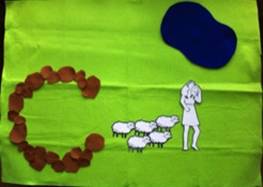
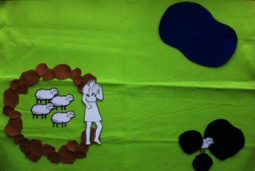
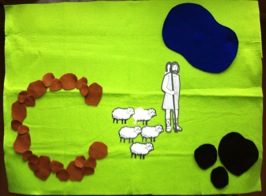
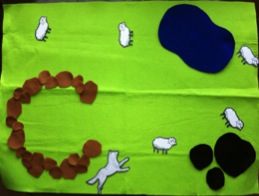
- Sin separates us from God and from each other. Only picture A shows Communion.
- Look at picture B. Why do you think is the sheep separated from the Good Shepherd and from the other sheep? Do you think that she just did not hear the voice of the Good Shepherd or she simply choose to not listen?
What happened on pictures C and D?
What happens next?
Thanks to Jesus’ death and resurrection we can RECONCILE – become ONE again.
Today we going to learn about the Sacrament of Reconciliation also called Confession.
The Parable of the Lost Son Luke 15:11-32
Narrator: 11 Then he said, “A man had two sons, 12and the younger son said to his father,
Younger son: ‘Father, give me the share of your estate that should come to me.’
Narrator: So the father divided the property between them. 13 After a few days, the younger son collected all his belongings and set off to a distant country where he squandered his inheritance on a life.
Younger son: ‘How many of my father’s hired workers have more than enough food to eat, but here am I, dying from hunger. 18 I shall get up and go to my father and I shall say to him, “Father, I have sinned against heaven and against you. 19 I no longer deserve to be called your son; treat me as you would treat one of your hired workers.”’
Narrator: 20 So he got up and went back to his father. While he was still a long way off, his father caught sight of him, and was filled with compassion. He ran to his son, embraced him and kissed him. 21 His son said to him,
Younger son: ‘Father, I have sinned against heaven and against you; I no longer deserve to be called your son.’
Narrator: 22 But his father ordered his servants,
Father: ‘Quickly bring the finest robe and put it on him; put a ring on his finger and sandals on his feet. 23 Take the fattened calf and slaughter it. Then let us celebrate with a feast, 24 because this son of mine was dead, and has come to life again; he was lost, and has been found.’
Narrator: Then the celebration began. 25 Now the older son had been out in the field and, on his way back, as he neared the house, he heard the sound of music and dancing. 26He called one of the servants and asked what this might mean. 27 The servant said to him,
Servant: ‘Your brother has returned and your father has slaughtered the fattened calf because he has him back safe and sound.’
Narrator: 28 He became angry, and when he refused to enter the house, his father came out and pleaded with him. 29 He said to his father in reply,
Older son: ‘Look, all these years I served you and not once did I disobey your orders; yet you never gave me even a young goat to feast on with my friends. 30 But when your son returns who swallowed up your property with prostitutes, for him you slaughter the fattened calf.’
Narrator: 31 He said to him,
Father: ‘My son, you are here with me always; everything I have is yours. 32 But now we must celebrate and rejoice, because your brother was dead and has come to life again; he was lost and has been found.’”
Possible questions:
- Is there any part of the parable that you pay attention to more than to the rest of it?
- In the beginning of the parable the younger son is asking for the share of his property. What is that “property” in our lives? What is the “property” or “inheritance” that God gives us?
As a clue we can remained ourselves what he says to the older son in verse 31: “And he said to him, ‘Son, you are always with me, and all that is mine is yours”. (Our gifts, talents, abilities, gifts and fruits of Holy Spirit)
- What brought him to himself?
See verse 17a “All my father’s hired worker’s have more than they can eat”.
He recalled his Father’s love. Our conscience works properly in the light of God’s Love. The gift of His Love is ability to recognise right from wrong. That is crucial in our life. But also, to make a proper examination of conscience we must recall His Love, perhaps by thanking Him for the most obvious gifts from Him…or read the verse from the Bible…Otherwise we will just tick boxes without any sorrow of the soul, without the CONTRITION…Contrition is a first stage of the Sacrament of Reconciliation. Look and this chart that your parents will take home for you…
- What did he decide to do?
In the verse 18 we read: “I will get up and go to my father and SAY”? It is important to verbalize what we have in our mind. That is why we confess. In the story of Creation God asked Adam to name all the animals in front of God to have power over them…
- How has the Father received his son? Did he say: “Now that you spent all the money you are coming back!!!! Go back!!”?
- How did Father react? See verse 20: “While he was still a long way off, his father caught sight of him, and was filled with compassion. He ran to his son, embraced him and kissed him”.
- What happened next, verse 21-24?
The son CONFESSED and the father FORGAVE. “CONFESSION OF SINS” and “ABSOLUTION” are two other stages of the Sacrament of Reconciliation.
- Why did the son tell father “I am not worthy to be call your son”?
He wanted to repay for what he has done. In the Sacrament of Reconciliation there is an important stage called “SATISFACTION”. We must do what is possible in order to repair the harm, often through penance given by priest; prayer, offering, service.
When we come to confession, we make a sign of the cross, and than we tell priest when did we go to the confession last time. Then we can close our eyes and talk to Jesus. When we finish we say the Act of Contrition.
- The ACT OF CONTRITION, after confession, has to have THREE elements
- Sorrow of the soul (I am sorry, I have sinned against the heaven and the earth)
- Asking for forgiveness (I am asking for forgiveness)
Resolution not to sin again (Please, God help me not to sin again)
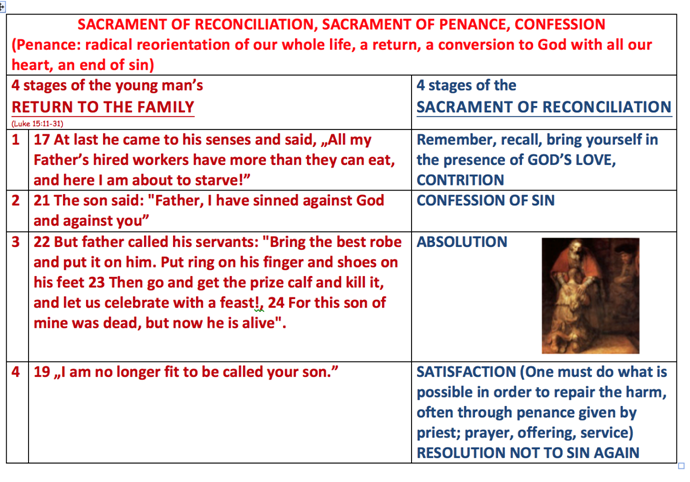
Reconciliation
So he got up and went back to his father.
While he was still a long way off, his father caught sight of him, and was filled with compassion. He ran to his son, embraced him and kissed him.
His son said to him…
Luke 15:20,21a
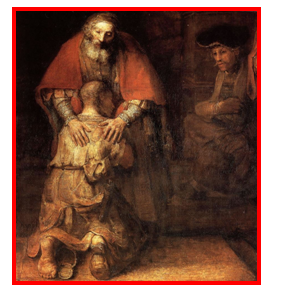
Remember how much the Good Shepherd cares for the lost sheep.
He gave His life to gather together all sheep that were scattered by the wolf.
We know God will forgive us for the times we didn’t get it right. The way to get ready for the Sacrament of Reconciliation is to find a quiet place to think and pray.
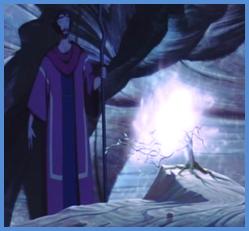
Do I make time to pray?
Do I recognise and thank God for His gifts?
Do I develop my gifts and talents?
Do I try to do my best in my homework and my schoolwork?
Do I look for reasons to do nothing?
Do I waste my time and health sitting for hours in front o television and computer?
Do I share my gifts and talents and serve God and other people?
Did I help someone without being asked?
Do I ask lonely children to play with me?

Do I make afford to come to Mass on time?
Do I remember that Jesus the Good Shepherd is calling us to participate in the Holy Mass?
Do I remember that Jesus’ death and resurrection is made present during the Holy Mass?
Do I participate attentively in Mass?
Do I make an effort, in Communion with Jesus and help of loving people, to “die” to my selfishness, laziness, doubt and fear or do I give up easily?
Do I make afford to fulfil my school and home duties?

Do I remember to listen to and follow the call of the Good Shepherd?
Are there things that are more important than Him?
Do I listen attentively to the Bible Readings during the Mass?
Do I say Lord’s name in vein?
Do I make effort to spend Sunday building Communion with God and with other people?
Do I make effort to be attentive and work hard at the catechesis and the Religious Studies lessons?
Do I love, respect and listen to my parents? Do I pray for them?
When asked, did I help my parents without complaining?
Do I respect and help elderly people?
Do I respect and listen to my teachers in school?
Am I selfish: do I only think of what I want?
Was I kind to people I saw today?
Did I hurt someone by what I said or what I did? Did I say I was sorry?
Do I forgive instead of trying to get even?
Do I make up after a quarrel?
Did I say the truth even when I knew it might get me in trouble?
Do I blame other children for I do wrong?
Do I speak badly about others “behind their back”?
Do I care for mine and other people’s property?
Did I return things that I have borrowed?
Did I watch pictures, movies and programmes that were not intended for children?
When we finish Confession we say the Act of Contrition.
- The ACT OF CONTRITION, after confession, has to have THREE elements
- Sorrow of the soul (I am sorry, I have sinned against the heaven and the earth)
- Asking for forgiveness (I am asking for forgiveness)
- Resolution not to sin again (Please, God help me not to sin again)
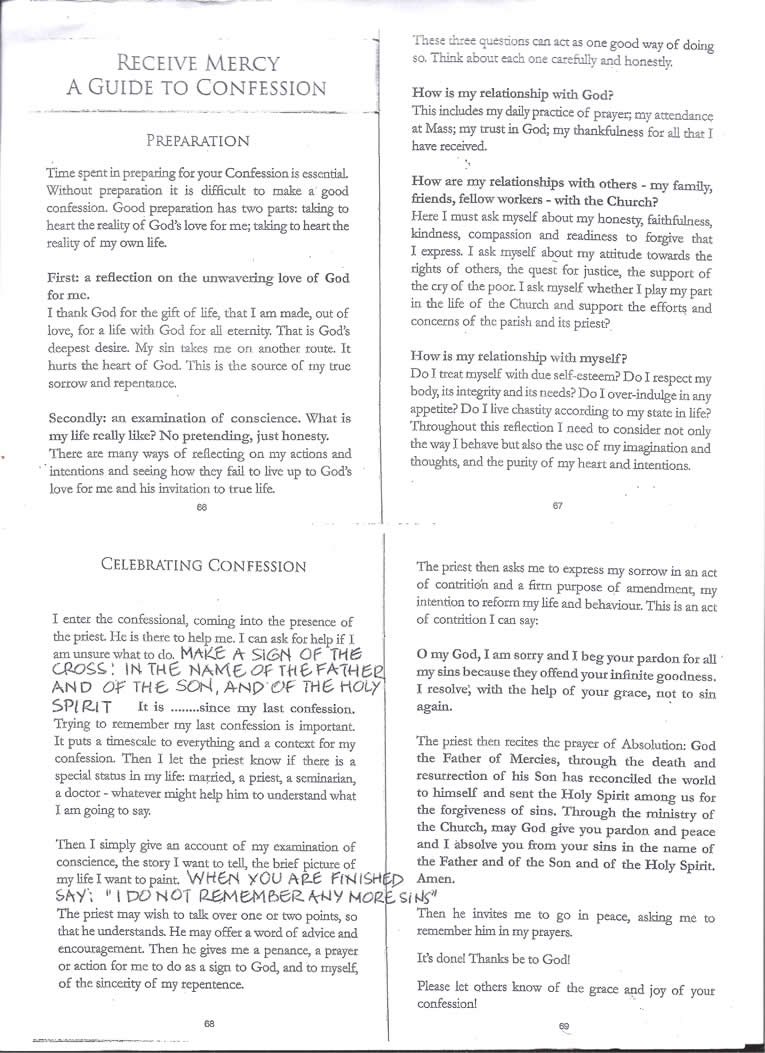

 English
English  Polski
Polski